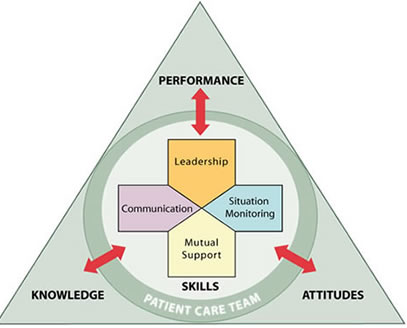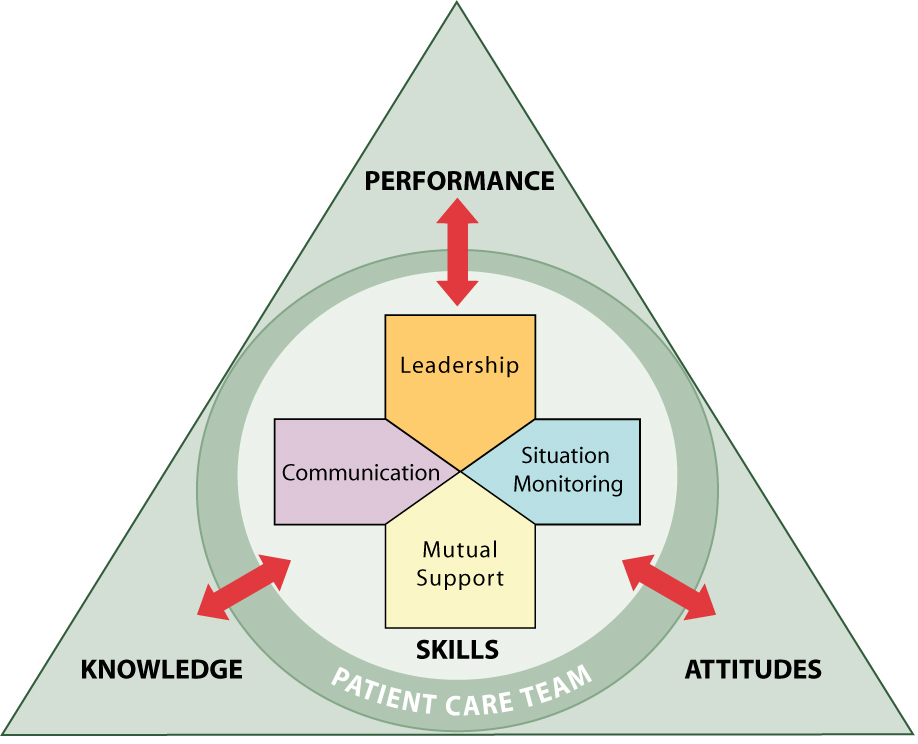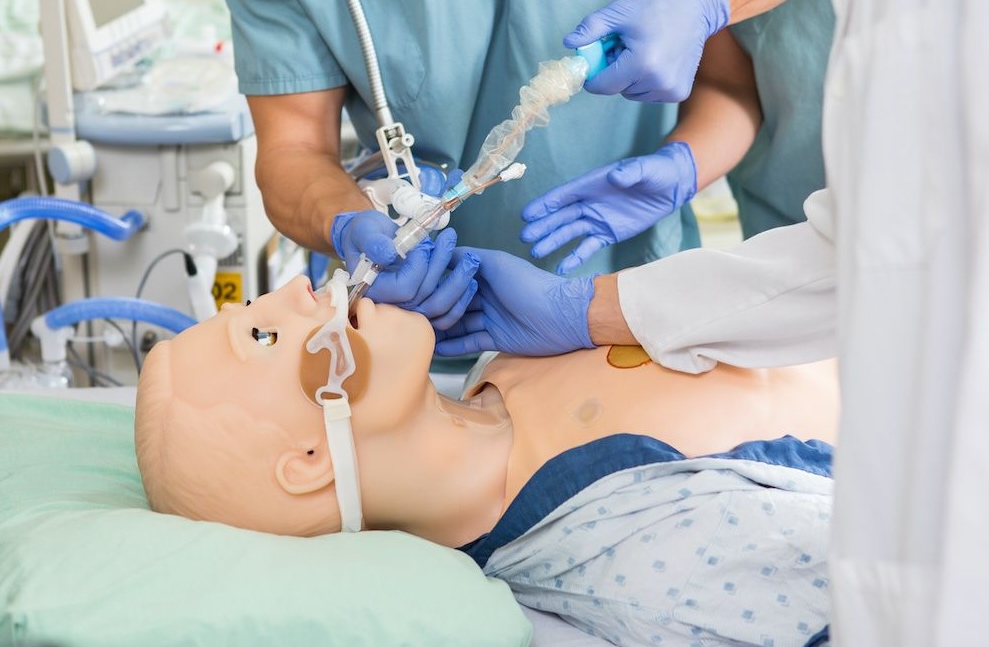
Thrilled to share that the AHRQ has enabled all of us to take their TeamSTEPPS team-based communication master trainer course for FREE! TeamSTEPPS is the “healthcare version” of aviation’s CRM communication tool which has proven to dramatically reduce errors in the field. This is the best communication model available for practicing in your healthcare simulation programs!
Our good friend Dr. Timothy Clapper PhD has written numerous articles on how TeamSTEPPS can be utilized in simulation training, as well as presented on the topic as the SimGHOSTS 2013 Keynote Address.
Learn more & register for the next course at the AHRQ.gov website!
What is TeamSTEPPS specifically?
TeamSTEPPS is a teamwork system designed for health care professionals that is:
- A powerful solution to improving patient safety within your organization. An evidence-based teamwork system to improve communication and teamwork skills among health care professionals.
- A source for ready-to-use materials and a training curriculum to successfully integrate teamwork principles into all areas of your health care system.
- Scientifically rooted in more than 20 years of research and lessons from the application of teamwork principles.
- Developed by Department of Defense’s Patient Safety Program in collaboration with the Agency for Healthcare Research and Quality.
TeamSTEPPS provides higher quality, safer patient care by:
- Producing highly effective medical teams that optimize the use of information, people, and resources to achieve the best clinical outcomes for patients.
- Increasing team awareness and clarifying team roles and responsibilities.
- Resolving conflicts and improving information sharing.
- Eliminating barriers to quality and safety.

More about the NEW Online Master Trainer Course
The TeamSTEPPS® 2.0 Online Master Trainer Course consists of 11 modules, 8 of which offer continuing education (CE) credits. Learners in a cohort or noncohort group completing the full course of all 11 modules and a coaching session with a TeamSTEPPS Master Trainer (also known as a teach-back session) not only receive CE credits, but can also receive certification as a Master Trainer. Learners can also choose to complete individual modules for CE credits only.
For example:
- Reynolds Army Community Hospital in Oklahoma decreased delays in surgery start times, and increased productivity just 6 months after implementing TeamSTEPPS.
- Montgomery Community Hospital, a critical access hospital in North Carolina, improved efficiency and effectiveness in high-risk pediatric situations.
- Madigan Army Medical Center in Washington State improved the time from decision to performance of an emergency Cesarean section, with no adverse outcomes for either the mother or the child.
We encourage potential master trainees to review the readiness assessment checklist to determine if this is the right time to begin implementation of the TeamSTEPPS initiative.
While multiple online classes will be made available throughout 2014-2015, the first course offerings include:
- Self-Paced (Noncohort) 1: Class starts January 7, 2015, limited to 350 participants.
- Group-Paced (Cohort) 2: Class starts January 12, 2015, limited to 100 participants.
The course timing and activities are:
Group-Paced (Cohort): Complete all 11 modules, view 3 Webinars, and teach a module to at least one Master Trainer in as few as 33 days but no longer than 120 days.
Self-Paced (Noncohort): Complete all 11 modules, and teach a module to at least one Master Trainer within 210 days.
While the course is offered at no cost to participants, AHRQ has committed significant resources to make the class available online. Professionals who want to be certified as Master Trainers will need to create a change team, submit a draft change plan and write a letter of commitment prior to enrolling in the course . Professionals wishing to obtain free continuing education credits but not complete the full course can still complete individual modules to develop mastery of teamwork concepts.
Modules:
1: Introduction (No CE credits) – Provides an overview and examines the science of team performance, beginning in aviation and migrating to health care. Discusses why patient safety is so important and how teamwork can make a difference
2: Team Structure (.75 CE credit) – This is the first step in implementing a teamwork system. Delineates fundamentals, such as team size, membership, leadership, identification, and distribution.
3: Communication (1.0 CE credits) – The focus is on how to communicate effectively through standardized information exchange strategies, such as SBAR, check-back, callout, handoff, and checklists.
4: Leading Teams (1.25 CE credits) – Identifies key behaviors that leaders need to make sure teams perform effectively and attain desired outcomes. Introduces brief, huddle, and debrief skills.
bCE credits) – Discusses gaining or maintaining an accurate awareness and understanding of the situation in which the team is functioning. Results in situational awareness and, ultimately, a shared mental model among team members.
6: Mutual Support (2.0 CE credits) – Reviews backup behavior that allows teams to become self-correcting, distribute workload effectively, and regularly provide feedback. Introduces specific approaches to managing conflict; each team member becomes a part of the safety net.
7: Summary (No CE credits) – Provides an opportunity for participants to review and analyze a video case study.
8: Change Management (1.75 CE credits) – Realizing change is difficult, introduces John Kotter’s eight-step model for successful change efforts. Discussion of each step includes its implications for the change effort.
9: Coaching (2.0 CE credits) – Coaching describes a specific action, such as encouraging, reinforcing, giving feedback, and demonstrating. As coaches are important change agents and assist with implementing teamwork initiatives, the session will discuss aspects of coaching as key components in an organization’s change strategy and plan.
10: Measurement (1.50 CE credits) – Measurement helps determine if TeamSTEPPS® worked. Discusses the Kirkpatrick model of training evaluation and identifies measures that can be used to assess the impact of TeamSTEPPS®.
11: Implementation Planning (2.25 CE credits) – Based on the principle of improving health care quality and safety by improving clinical processes. Focuses on developing an actionable implementation plan for your organization.
Learn more & register for the next course at the AHRQ.gov website!













